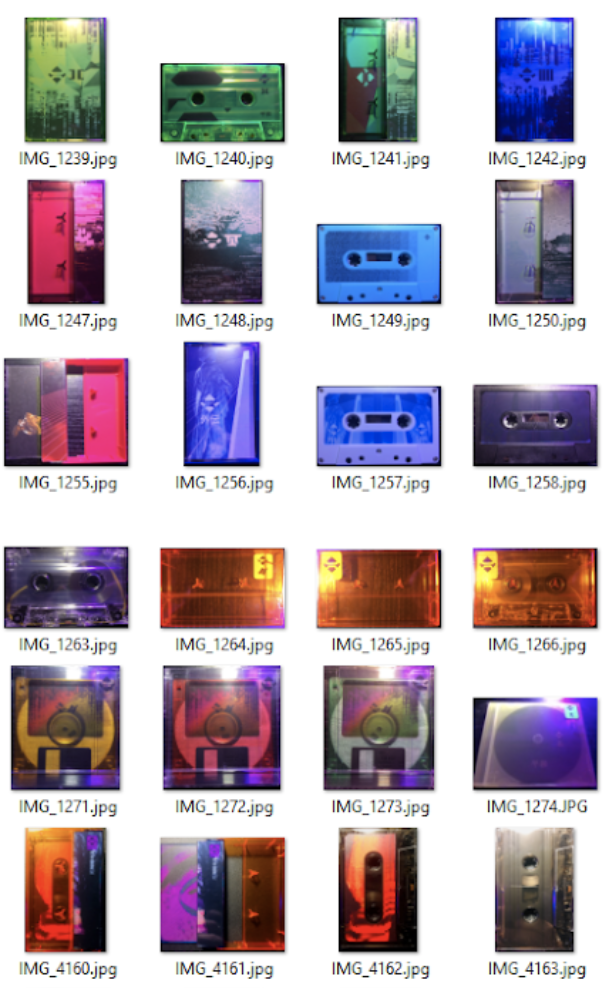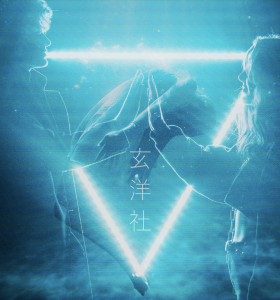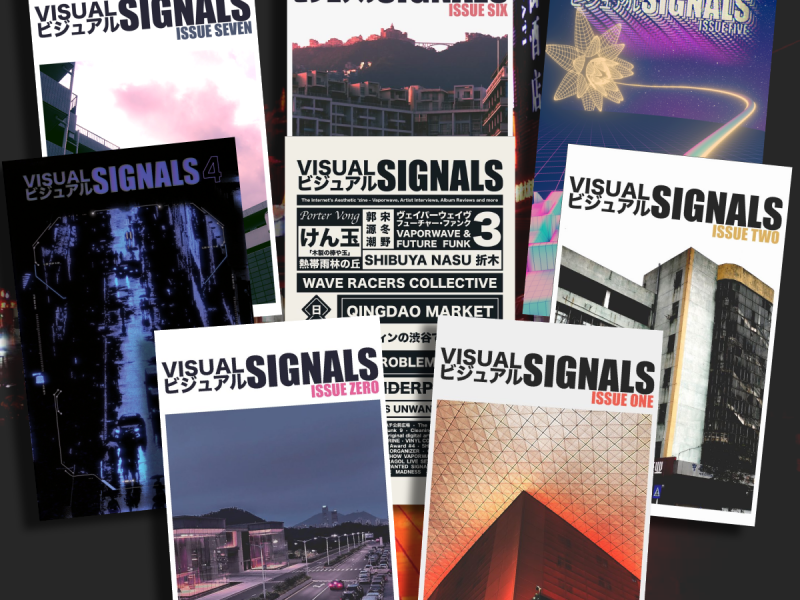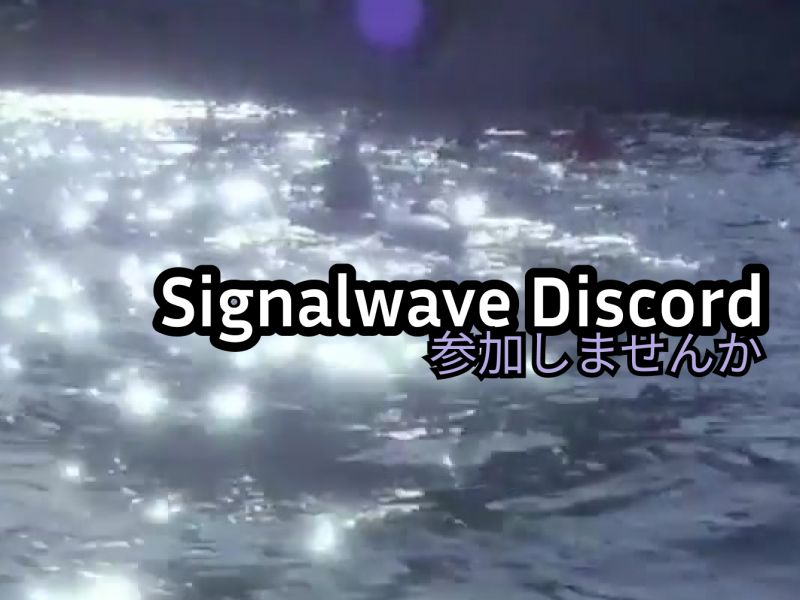“Initially, I became interested in R-Infinity not by what I heard, but by what I saw: a pink, wordless logo that evoked the Black Mesa Research Facility cassette or the Weyland-Yutani Corp. in Alien. And the album titles were cryptic, even by vaporwave standards: 1111, TTT, and Delphi Oracle 外伝 .Mid. By time I got around to the music–midiwave meets dreampunk cloaked in dark-ambience–I was hooked. When the cassette I bought arrived, I was intrigued further still. It came in its own logo-stamped hand-cut cardboard container! The translucent shell, the double-sided JCard, even the thick, post-less case—it all added up to one of the highest quality physical releases I’d held, and this was entirely a DIY effort by an artist unknown to me. I’ve bought every release since. And because the music is of the highest caliber, as good or better than anything on Vill4ain or recent Dream Catalog, R∞ has become one of the artists whose entire discography I collect. I reached out to Ryan and here’s what he had to say.” — Eric Roy
Could you tell me how r-infinity has evolved over the last few years?

I began making music a long time ago. I have produced many different styles, and used many different aliases along the way. R∞ is what I use at the moment, and it was catalyzed by vaporwave. As a genre, it contained shards of ideas that I had started to explore previously, and it was inspiring. I was drawn to the early vaporwave that drifted into ambient styles, and that is where my albums started.
As far back as my third album, ][ in June 2018, I saw that vaporwave may not always stay in the frame of one era. Since nostalgia is an integral idea of the genre, new generations (more recently born) will have a different perspective of nostalgia, and the period of focus will shift. My own experiences of nostalgia were from the 90s, and were anchored by the futurism of the era. When I was exploring what my own form of vaporwave might be, my musical focus shifted to crafting alternate timelines and nostalgic moods of things like Ghost In The Shell, Akira, and the Wip3out franchise. As a very concrete example, ][ was a daydream about living in a rainy, dystopian Japan, in the mold of a cybernetic world. I imagined periods where I would be resting, or enjoying the city, and periods where I would be out on missions, trying to earn money to survive. There was a flow back and forth. And some cases, I dropped the slow, reverb laden template of vaporwave entirely, or weaved it through songs in an alternating pattern. The style wasn’t entirely different, but it wasn’t the same either. I recently began calling this cybervapor, as a way to distinguish the harder and more defined edge I have been using. As I experimented more, I started melting down the barriers between individual tracks and simply releasing albums as 30 or 40 minute single songs, so the flow between hard and soft could be blended more easily. That contrast is defining what I do now — cybervapor is removing some of the slushyness and substituting some harder, grittier elements. I often imagine it’s what would be playing in a nightclub in the future.
I understand you often start with the art first, even going so far as having an actual physical release made in advance of creating the music therein, which runs opposite of traditional thinking. Are you still doing that? And what are the pros and cons of such a strategy?
Yes, and I was defined by working that way. I continue that method now – I will work far ahead of myself, and lay out many concepts. Some I will use and some will be put away and they’ll remain here with me. In some cases, I’ve already constructed 10 or 20 copies. Sometimes I dig through my boxes, and it’s like remembering old dreams – flashbacks of the unfinished and forgotten, but snapped back into my consciousness when I pick up that plastic.

Sometimes the physical item changes the music. It is all vertically integrated — if I change one thing, I feel like I have to change many others. When an idea survives this process, it feels very complete to me. But it’s not efficient. Sometimes it feels like I’m constantly turning myself around in circles. It causes loss.
KUNOICHI has a related story – it was an album that came out of nowhere. I had been working on an ambient album called 999, for months — but I was never happy with it. Out of boredom, I created an album cover for something new, and then started playing around with tracks. I finished the whole thing over a weekend, while the other album still sits unfinished — even though I had already manufactured 20 tapes or so for it. I just dumped them into a drawer.
I often think about ways I can leak some of those things into the world without actually releasing them. As a way to experiment. And at the same, I wonder if they’re worth releasing at all. I find that to be one of the most difficult parts of what I do — even when I’m sure something is good, I’m still really not sure. Maybe the album I threw in the drawer was my best work, and I just didn’t know. If I spend too much time thinking about it, I would just stop entirely. So I try to find mechanisms that let me move forward.
One of those mechanisms is attempting to be patient, yet spontaneous, simultaneously. You have to be relentless in your ability to edit yourself, and to destroy what you make, over and over and over, until you’ve forged something that is a true representation of your potential. Sometimes there is an excitement, but it’s telling you to start over. Other times it tells you to keep pushing on. Somehow, when I look at the physical objects first, it tells me what I need to hear.
How and why did you come up with the Accident in Paradise side-project?
It was a way to leak some of this work I’ve been talking about. Those tracks started as a simple experiment for me – I wanted to see if I could capture the feeling of more classic vaporwave without using samples, just writing everything from scratch. I honestly don’t think I achieved that goal, but it didn’t matter — I liked the new sound that came out. I decided I wanted to brand it differently, and AIP just became a different facet of me with a certain sound. I ended it after 2 albums, but it did influence my release IIΓI quite a bit, so I consider those 3 releases a trilogy of sorts.
And for Black Viper Science?
At the beginning of 2020 I had this idea that I could make slushwave using my own original work as the samples, and that idea might even carry through several layers deep (continually re-sampling myself). But I didn’t want to re-release tweaked versions of my previous tracks under R∞, that felt disingenuous. So I created another brand, so I could have another leak. It removed an obstacle for me. I didn’t plan this sort of thing from the beginning, but I have discovered that it’s helpful to my process to be able to create new aliases when I’m feeling blocked, I have embraced it. I don’t expect to stop anytime soon.
Interesting, that sampling yourself could lead to something so different and exciting.
Unlike my other experiments so far, Black Viper Science had success from the start. I have been devoting time and effort to keeping it going. You’ll be seeing more releases and cassettes under that label.
You’ve been putting out releases under the R-Infinity banner since 2018, which isn’t that long, but you have a lot of releases in that time period, and you’ve done multiple formats (cassette, minidisc, compact disc, floppy)–what are some things you could offer as advice to a beginning producer when it comes to offering a physical release?

When you take the means of production into your own hands, you put yourself in a position of strength.
If you understand how to make your own art, how to dub your own cassettes, how to package everything up – you’ve created a toolbox for yourself that is going to pay off down the line. You don’t need to spend large amounts of money to put together a quality release. This is how vaporwave started, and I like that aspect of it. You are also not constrained by copyright, or the rules of a record label, or the rules of a dubbing shop. Keeping this aspect alive is important if you’re going to keep plunderphonics or classic vapor available. I think we’re seeing a trend where artists are shying away from sampling because they are trying to create big releases on major labels. Small, underground, self-released physicals give you a world of freedom in which to experiment.
My own experience has shown me that creating a vertically integrated release – where you’ve got a high degree of personal effort in the music, the art, the printing, the manufacturing, the packaging – all of it – people will respond to that. Your style has influenced the whole thing. And I had to craft this physical item with my own hands, and with my own time, and really look closely at it and question it – is this an item you would actually pay for?
And maybe you’re not good at drawing, or painting, but you don’t have to be. Take something you can do, and make that your art. photography, random splashes of paint, clip art, crude screenshots of Microsoft Paint shapes – whatever. If you choose something and do it yourself, it expresses something about you that would have been missing otherwise. And then you always have it! Your style is always there for you, and you build upon it and grow it.
After manufacturing my first few albums, I realized that the regular thin plastic Norelco cases used on most tapes now are pieces of shit. They’re not the same as the vintage cases from the 80s. They were always cracking and chipping and I didn’t like how they felt. So I started looking for alternative kinds of cases that were thicker, and that’s all I use now. The case became part of my style. Find that kind of thing for yourself, don’t just throw music on a tape.

Any plans to re-issue some CLASSICS you put out early in very small runs? OOO, TTT, 1111, 2222, ][, Delphi Oracle—didn’t Holojamz re-release this?
Yes, Delphi Oracle got a second edition through Holojamz called DELPHI ORACLE 外伝 EX .MID.
The people running Holojamz are awesome – they’re using their position to find some really innovative releases from new artists, and give them a voice. They’re also very concerned about being fair, and building partnerships. We started talking about partnering for a release, and we both landed on Delphi Oracle and then everything fell into place easily. I feel like they’re expanding the scene and making it more inclusive, which is one of my goals as well, so working together made sense.
I was originally not planning to reissue any of my releases – this is the first time I’ve done that. I might do it for a few other albums now, but not my whole catalog. Some of those albums belong as small, underground releases and I want to keep them that way.
Anything you might do differently? I ask this because it’s not easy to google R-Infinity and find you and your music. Usually I wind up finding a math site or the Rynberg Constant. But this can also be GOOD in that strange way obscurity garners more interest than, say, constant, blatant self-promotion, which can be a turn-off. Any thoughts about that?
Yes, I have embraced the obscurity. I don’t care if I’m difficult to find.
This isn’t my career – it doesn’t pay the bills. I became serious about music because I wanted to listen to some really specific kinds of music, and no one else was making it. I love my fans and how they really appreciate what I do, but expanding my fanbase or building a popular record label aren’t my goals. Even if I release some really bizarre shit and I’ve only got 5 people buying my tapes or something – I’m happy with that and I’ll just keep going. It feels like musical enlightenment to not worry about anything.
I hope some people in the future discover one of my tapes in some random music shop, or at a garage sale, or they find my catalog online in a zip file, and they’re just like, what the hell is this? It will be difficult for them to figure out who I am or where I came from — I purposefully don’t put words or links on my physicals because I’m actively trying to accomplish this. I became really invested in this idea because it seems like such a counterpoint to how the music industry usually operates. I feel like it’s making that statement, and it’s an extension of something that’s integral to vaporwave.

Right on. Inclusiveness, enlightenment, I like that. What are some options for under-represented/appreciated artists out there that they might not be aware of?
I want every aspiring musician reading this to understand the importance of self- actualization. You need to reject internal presumptions you have created of what you should be doing, and examine yourself deeply to discover the style and process that gives you pure excitement about what you are producing.
To illustrate simply: in my earlier years of music, I would spend months and months of time creating music, night after night. But every day, I would hop into my car and turn on the radio and go about my life and listen to other people’s music. If I was not relentlessly excited about listening to my own music, why would anyone else bother to listen? What was the purpose of all that work? I was making music that I thought I should be making and it was boring — I was preemptively trying to put my music into some well known genre boxes. That’s a rather vague way of describing it, but I would suggest you contemplate that question for yourself. What do you think you should be making? If you can describe it easily — maybe you should experiment more until you can’t describe it easily. That seems like a more interesting and exciting album, right?
More recently, I have found myself actively setting aside time to listen to my own music because it benefits my life! It is relaxing, it is inspiring, it gets me through a bad day! What a difference! I reached deep inside myself and made music for me. I took control of it, in its entirety. I was not concerned with anything besides a feeling of personal fulfillment.
When I did this, my music was a representation of my true self, and it became effortless to produce. I did not become instantly rich or famous and my fanbase did not grow to an incredible size, but for those who were listening, it seemed effortless to inspire them as well. I think if you can stay on this narrow path, then eventually you will find bigger successes.
What are some independent artists that you’ve come across you feel should be more appreciated?
Instead of cherry picking just a few individuals and listing them here, I’m going to encourage your readers to join one of the many communities in the scene – there are many, many facebook groups and discord servers dedicated to vaporwave, slushwave, dreampunk, future funk, and other sub genres – and get involved with one or more of these groups. This is where you find some really amazing stuff that no one else has heard of. These groups are essential to keeping the scene moving forward.
Any shout-outs or final thoughts?
I want to encourage all the artists, and all the fans of vaporwave and its related genres, to keep the idea of underground vaporwave, and music, alive. The internet has given us the power to connect artists to fans directly — don’t give that up. Self release your work and do exactly what you want. Be inclusive of new people and new ideas. Pay artists directly. Create mixtapes and bootlegs and share them. Find personal fulfillment in what you make. Music is a uniquely human and important experience — don’t take it for granted!
Find more of R∞ online:
- Discogs: https://www.discogs.com/artist/6476595-R
- Bandcamp: https://rrrxrrrxrrr.bandcamp.com/
- Twitter: https://twitter.com/_rrrxrrrxrrr
An abridged version of this article was
originally published in Visual Signals: Issue 4

